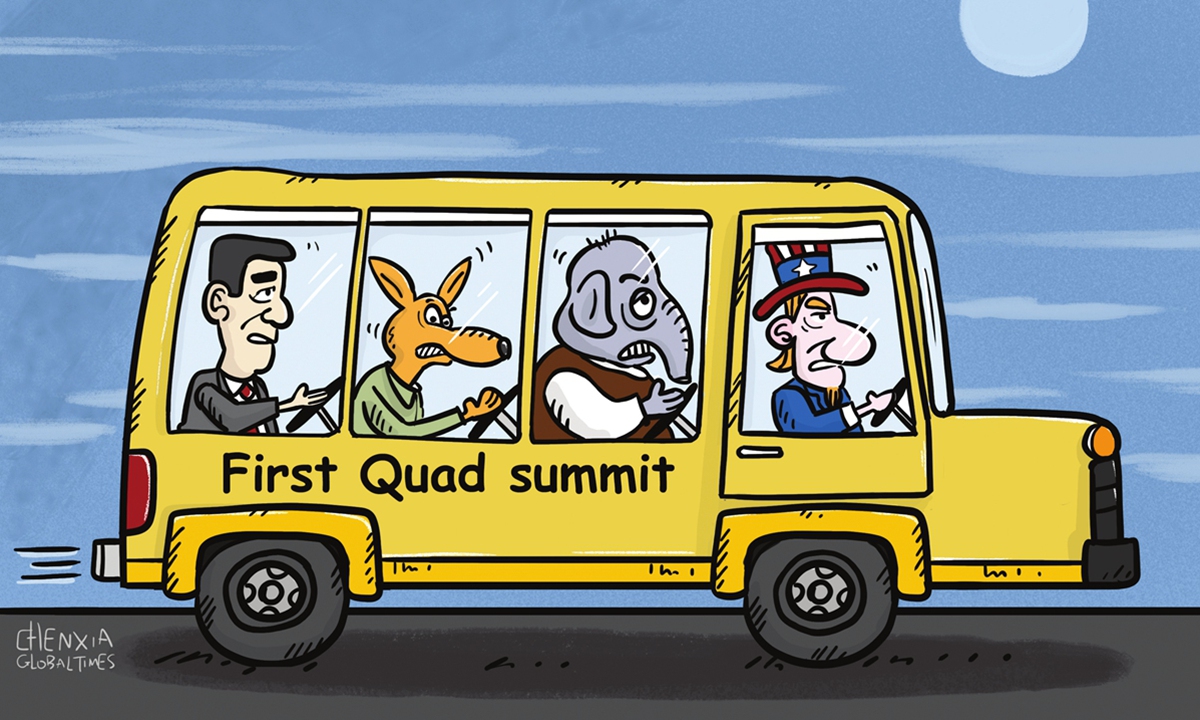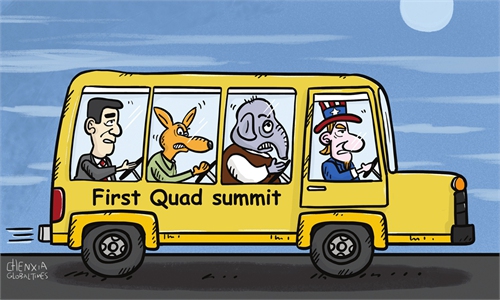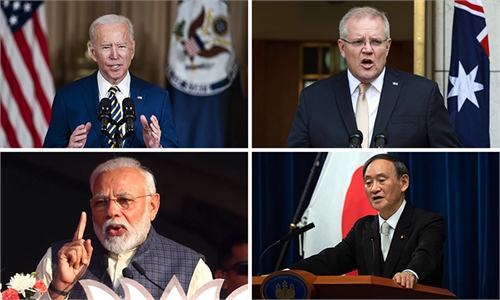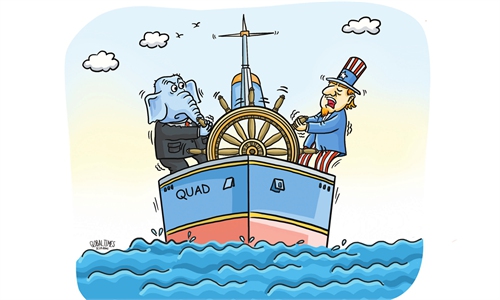
First Quad summit Illustration: Chen Xia/GT
The Quad is an informal security group consisting of the US, Japan, Australia and India. Under this rubric, they label themselves like-minded countries.Yet soon after its first ever leaders' summit held on Friday, some voices of discord are emerging about the block.
The joint statement of the latest summit claims that, "together, we commit to promoting a free, open, rules-based order." Yet an Indian scholar, Manoj Joshi, distinguished fellow at India-based think tank Observer Research Foundation, wrote in an article published Tuesday that, "The problem is that no one is clear as to what the rules-based order means… there is no agreement on which rules, whose rules, and, indeed, the term itself."
Joshi is right. There is ambiguity on what a free, open, rules-based order is. Some results were reached in the Quad summit. These included the issue of collaborative vaccine production, but when it comes to security and the Indo-Pacific security framework, all they had talked about were quite grand and vague without specific contents. The so-called common values and common security are nothing but illusory concepts. When it comes to free, open, rules-based order, each Quad member has its different focus.
Joshi said, "India is in a peculiar bind here. On the one hand, it is following the US lead in implementing the RBO [rules-based order] in relation to the Indo-Pacific, and on the other, we have External Affairs Minister S Jaishankar complaining about Western organizations questioning India's adherence to a rules-based democracy."
In Western countries' opinions, when it is necessary to highlight confrontation with China, they will promote and praise India's democracy. They declare that India is the largest democratic country. But when their need for India is not so strong, they criticize India's democracy as flimsy. This is, in fact, hypocrisy.
Although Quad members launched a plan to boost India's COVID-19 vaccine production capacity, this didn't prevent Western media from pouring criticisms on India over the country's vaccination drive. An opinion piece on the New York Times on Monday punched at India's "bureaucracy, inefficient delivery and a rich-poor disparity" that are hobbling the country's vaccination drive. It claimed the second COVID-19 wave is moving faster than India's bureaucracy. US media outlets such as the New York Times and CNN are essentially pro-Democratic Party. They are inclined to focus on reporting the negative side of India. They often run articles that accuse India of moving in a more authoritarian direction.
Media in the US and other Western countries have been criticizing India's "degraded" democracy for a while. They lambaste it by saying that India's democracy is becoming more and more authoritarian. Whether it is the growing influence of the Bharatiya Janata Party in India, the controversial Citizenship Amendment Act, the mistreatment of Muslims, or the internet shutdown during the farmers' protests, India has attracted a lot of criticism from the West. Under such context, the Quad members still hypocritically stand together, emphasizing that they are like-minded allies. But in fact, these are just slogans used to achieve their geopolitical purposes.
China was not mentioned in the joint statement the Quad issued after its summit, but people understand that they are actually targeting China. However, when it comes to dealing with specific China-related issues, the four countries have different considerations. All the four have close economic relations with China. Even though they claim that their so-called common values and interests are a priority, they still need to properly handle the Chinese market. This really means their interests are with China. This, however, conflicts with their political will to openly confront China.
The Quad grouping has put forward a grand goal to establish a free, open, rules-based order in the Indo-Pacific region. Please also don't ignore the fact that there are already many mechanisms (such as ASEAN in Asia) that are more mature than Quad that can be utilized.
These mechanisms hold the potential to better reflect the common interests of the people in the region. Time has changed. With so many other mechanisms in Asia, this question might be raised: How attractive will Quad be? The fact is this: The future of Asia lies in economic frameworks such as the Regional Comprehensive Economic Partnership.
How far the Quad grouping will actually go also depends on the results of China handling bilateral relations with each of the Quad members. China and India are making efforts to bring the ties back to a normal track after the border standoff from last summer. China is sending goodwill to Japan over many issues, with Japan's hosting of the Olympic Games in particular, in an attempt to create sound conditions for stable Japan-China ties.
When it comes to China-Australia relations, there is still room for a turnaround given the fact that there are still many rational voices calling for an end to Australia's hostile policy toward China in Australia's business circles. Besides, China and the US will soon have their Alaska meeting.
As long as China can properly address bilateral relations with each Quad member, this can help dilute their joint containment of China.
The article was compiled based on an interview with Qian Feng, director of the research department at the National Strategy Institute at Tsinghua University. opinion@globaltimes.com.cn



